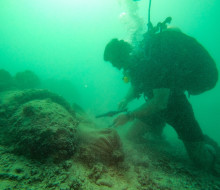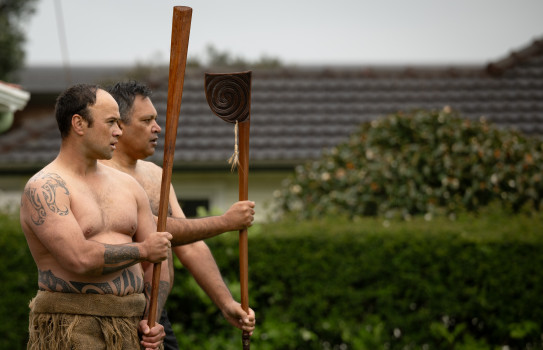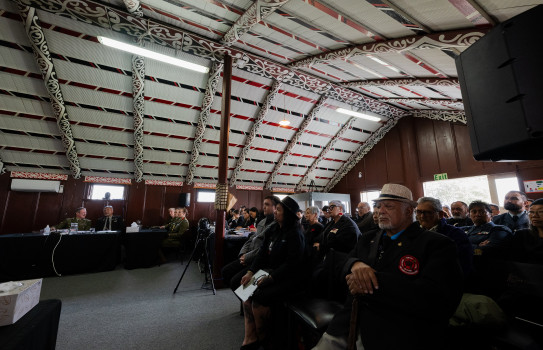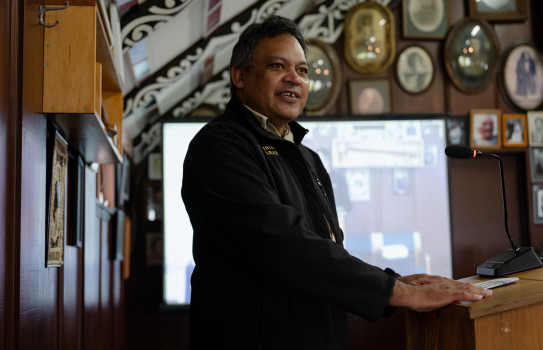
Second World War-era bombs in Vanuatu made safe by Navy divers
26 June 2024
Unfortunately you are viewing this website on an outdated browser which does not support the necessary features for us to provide an adequate experience. Please switch to a modern browser such as latest version of Google Chrome, Mozilla Firefox, Apple Safari or Microsoft Edge.
Ngā mihi nui
The Waitangi Tribunal has heard dozens of accounts from Māori veterans and their whānau, as well as relatives of service personnel no longer with us, as the latest claimant stage of the Wai 2500 Military Veterans Kaupapa Inquiry concluded in Whakatāne.
Stage One of the inquiry is specifically looking at evidence from claimants regarding a number of campaigns and operations from the 1950s to modern-day, in relation to concerns raised by Māori ex-service people and/or their whānau.
Chief of Army, Major General Rose King, was among senior Army and New Zealand Defence Force (NZDF) personnel in attendance for the hearing week at Whakatāne’s Wairaka Marae last week, and said it was humbling to hear the accounts of veterans and their whānau.
Firstly, I’d like to acknowledge those who have provided testimony - not only this week, but throughout this process. For our veterans and their whānau, it’s been a long journey to get to this point, and I want to tautoko their bravery and courage in sharing their experiences. It has been nothing short of inspirational.
“We fully acknowledge that mistakes have been made; tikanga was overlooked, our people and their whānau weren’t cared for appropriately. It’s impossible to ignore that when you hear their testimonies.
“It is also important to note that progress has been, and continues to be made in this area, and we are continuously looking for opportunities to better support our veterans, their whānau and our current serving personnel.”

Tangata whenua welcomed the New Zealand Defence Force contingent onto Wairaka Marae in Whakatāne to get the latest Wai 2500 hearing week underway.
Chief of Army Major General Rose King and Sergeant Major of the Army Warrant Officer Class 1 Dave Alder were among the senior NZDF leaders in attendance this week.

The Tribunal heard evidence from claimants regarding a number of campaigns and operations from the 1950s to modern-day.

Master of Ceremonies Major Vince Copeland speaks as the week drew the latest claimant stage of the Wai 2500 Military Veterans Tribunal to a close, with three Crown hearings set down for 2025.
Last week the Tribunal heard further evidence from campaigns and operations from Korea and South East Asia, missions to Antarctica, Nuclear Testing, Afghanistan, Peacekeeping and Observer Missions, broadly covering the period from the 1950s through to present day.
Some of the key themes that have arisen during this stage of the Kaupapa Inquiry have included, but were not limited to;
The Tribunal has also heard evidence of how the culture within the NZDF has evolved in recent years, with positive feedback for the bicultural journey the Defence Force is on, noting in particular the creation of the three Service marae as a key driver for positive change.
The inquiry will now prepare to move onto the next stage of proceedings, which is a series of three Crown hearings which will be the Tribunal’s chance to hear the Crown’s perspective in relation to the evidence heard from claimants regarding campaigns and operations from the 1950s through to recent, modern-day operations.
The purpose of these hearings is to demonstrate that the Crown has listened to and engaged with the claimants in order to inform change.